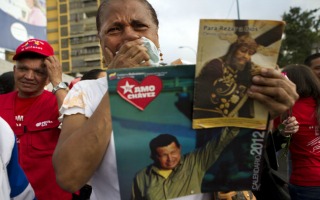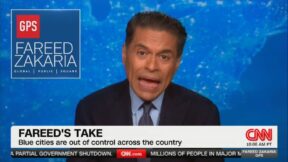The Nation Eulogizes Hugo Chavez: He ‘Wasn’t Authoritarian Enough’
 The progressive publication The Nation published an obituary for the late Venezuelan President Hugo Chavez on Wednesday in which the author took the contrarian viewpoint that Chavez’s dictatorial rule was “not authoritarian enough.” In the piece, author Greg Grandin, a professor at New York University, takes a stab at why Chavez was so disliked by the U.S. government and dissects his legacy. Grandin examines the left’s disillusionment with Chavez and laments that the Latin American strongman was not the autocrat his opponents made him out to be.
The progressive publication The Nation published an obituary for the late Venezuelan President Hugo Chavez on Wednesday in which the author took the contrarian viewpoint that Chavez’s dictatorial rule was “not authoritarian enough.” In the piece, author Greg Grandin, a professor at New York University, takes a stab at why Chavez was so disliked by the U.S. government and dissects his legacy. Grandin examines the left’s disillusionment with Chavez and laments that the Latin American strongman was not the autocrat his opponents made him out to be.
RELATED: NY Democrat Stands Out In Congress By Tweeting Praise For Hugo Chavez
“I think what really rankled [American officials] was that Chávez was claiming a privilege that had long belonged to the United States, that is, the right to paint its adversaries not as rational actors but as existential evil,” Grandin wrote.
He observes that Chavez came to power after several decades of sprawling corruption in Venezuela had become the norm. Further, Venezuela’s system was lauded by the United States as an anti-Cuban model, provoking the ire of average Venezuelans.
“Over the last fourteen years, Chávez has submitted himself and his agenda to fourteen national votes, winning thirteen of them by large margins, in polling deemed by Jimmy Carter to be “best in the world” out of the ninety-two elections that he has monitored,” Grandin continued. “[E]ven his opponents have admitted, despairingly, that a majority of Venezuelans liked, if not adored, the man.”
Let’s set aside for a moment the question of whether Chavismo’s social-welfare programs will endure now that Chávez is gone and shelve the left-wing hope that out of rank-and-file activism a new, sustainable way of organizing society will emerge. The participatory democracy that took place in barrios, in workplaces and in the countryside over the last fourteen years was a value in itself, even if it doesn’t lead to a better world.
Grandin posits a theory towards the end of the piece in which he examines how Chavez’s legacy might be different if he had really behaved like the dictator his opponents accused him of being:
Chávez was a strongman. He packed the courts, hounded the corporate media, legislated by decree and pretty much did away with any effective system of institutional checks or balances. But I’ll be perverse and argue that the biggest problem Venezuela faced during his rule was not that Chávez was authoritarian but that he wasn’t authoritarian enough. It wasn’t too much control that was the problem but too little.
Read the full obituary via The Nation
> >Follow Noah Rothman (@NoahCRothman) on Twitter
New: The Mediaite One-Sheet "Newsletter of Newsletters"
Your daily summary and analysis of what the many, many media newsletters are saying and reporting. Subscribe now!






Comments
↓ Scroll down for comments ↓